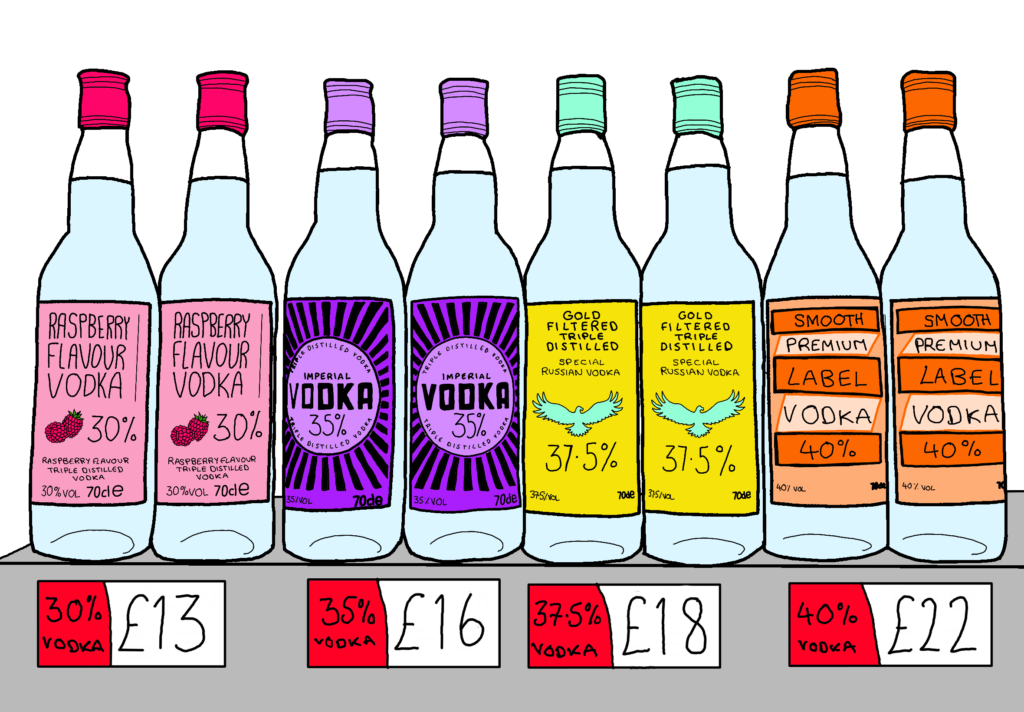Research has revealed the impact that Minimum Unit Pricing of alcohol has on people who drink at harmful levels.
MUP sets a baseline price at which a unit of alcohol can be sold. Its goal is to prevent strong alcohol from becoming too cheap, so that those with drinking dependencies can easily purchase high amounts.
According to research published by The University of Sheffield, there is no clear evidence to indicate that Minimum Unit Pricing of alcohol has caused a change in consumption or severity of dependence among people who drink heavily.
In both Scotland and Wales, the MUP is 50p per unit, meaning a standard 2.5 unit pint of beer cannot be sold for under £1.25.
Working alongside Public Health Scotland, the study evaluated the impact of MUP on people who drink at harmful levels, including those dependent on alcohol and those accessing treatment services.
The findings suggested that not only does MUP not influence the drinking habits of heavy drinkers, but the increased prices may be doing more harm than good.
Since MUP’s inception in Scotland in 2012, some economically vulnerable groups have experienced increased financial strain as price rises meant they were spending more on alcohol. This led to some people who were dependent on alcohol to reduce expenditure in other areas, such as food and utilities instead.
Professor John Holmes, Professor of Alcohol policy at the University of Sheffield, says this study, among others, serves to highlight the importance of continued investment into alcohol treatment services.
“Our study shows that people with alcohol dependence responded to MUP in very different ways. Some reduced their spending on other things, but others switched to lower strength drinks, or simply bought less alcohol,” he says.
Although the MUP’s influence on heavy drinkers may not always be positive, Holmes says that previous studies have shown that MUP reduced alcohol sales, which included those who bought the most alcohol before the policy.
Public Health Intelligence Adviser at Public Health Scotland, Helen Chung Patterson, saysthe complexity of the circumstances surrounding alcohol dependency makes the true impact of MUP somewhat opaque.
“People who drink at harmful levels, and particularly those with alcohol dependence, are a diverse group with complex needs – who often experience multiple interacting health and social problems,” she says.
“They are therefore unlikely to respond to MUP in one single or simple way. Many are likely to drink low-cost high-strength alcohol affected by MUP and are at greatest risk from their alcohol consumption.
“This population therefore have the potential to benefit the most from MUP, but may also continue to experience harm.”
Northern Ireland is currently consulting on proposals to introduce MUP, making England the only part of the UK that does not currently plan to introduce it.
Illustration: Sophie Donne
You may also like
-
Survey finds Gen Z prefer marijuana to alcohol
-
Microneedle patches may soon be able to track how much alcohol you’ve had to drink
-
The non-alcoholic beer industry is expected to grow tenfold by 2025
-
Alcohol tag scheme to expand after successful trials in England and Wales
-
Alcohol consumption in reality TV could be harmful for younger audiences, study finds

